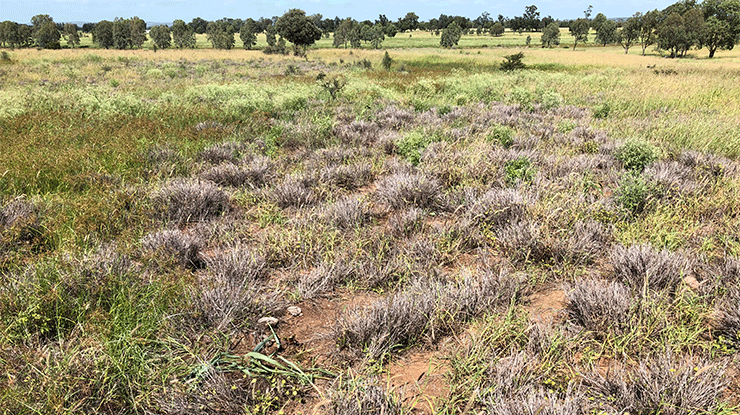 An example of pasture dieback.
An example of pasture dieback.
How susceptible are your pastures to dieback?
Pasture dieback is a condition affecting the higher productivity grazing districts in eastern Queensland and north‑eastern NSW.
Tropical sown grass species are the main ones affected and through reduced pasture yield the productivity of affected properties can be severely impacted.
It’s different to other conditions which can reduce the productivity of pastures, such as pasture decline or ‘rundown’, overgrazing, poor soil fertility, compaction, variable rainfall and temperature dynamics or a combination of these factors.
MLA is working with research and government partners to better understand the causes and management options to address the issue, and researchers are studying numerous subtropical and tropical pasture grasses.
What pasture species are most susceptible?
All commonly sown tropical and subtropical improved pastures are reported to be affected by pasture dieback.
The main species affected include buffel grasses (cultivars Gayndah and American), creeping bluegrass (cultivar Bisset), Rhodes grasses, pangola, paspalum and setaria.
A very limited number of native pasture species are also reported to be affected.
These include Forest bluegrass (Bothriochloa bladhii), Golden beard grass (Chrysopogon fallax) and Black speargrass (Heteropogon contortus).
What pasture species aren’t as susceptible?
Some grasses appear to be more tolerant (take longer to be affected) than others, however eventually these can still die.
Some specific grass varieties of affected species, such as Biloela buffel, have been reported to be more tolerant in locations where Gayndah and American buffel have been completely decimated.
Legumes – including annuals such as lablab and perennial species such as desmanthus, butterfly pea and stylos – are all reported and tested to be highly tolerant or resistant to pasture dieback.
There are reports of patches of leucaena dying out, but the cause has not been identified.
Annual forages such as forage sorghum and oats appear to grow satisfactorily in affected areas but further testing is needed to develop knowledge of other forages.
What about mixed pastures?
Mixed pastures seem to be more resilient.
It’s common to find pasture dieback in buffel grass monoculture pastures especially where the pasture yield is moderate to high.
However, not all monoculture buffel pastures have dieback.
The impact of dieback in monoculture pastures is more obvious due to the lack of other species present. Pasture dieback is also common in non‑grazed situations, such as roadsides, where there is a diversity of species.
Pastures may recover completely without intervention, but research and field surveys show that pastures made up of grass and legume mixtures tend to recover better – the higher the proportion of legumes in the mix, the more resilient the pasture.
Will any plants survive in a paddock of dieback?
Yes, in some locations pastures have recovered without any intervention.
However, recovery can take years, problematic weeds can proliferate in the meantime, and the recovering pasture species might not be the most productive depending on what the seedbank in the soil contains.
What research is underway?
MLA is supporting research to identify pasture species that can restore beef productivity in dieback‑affected paddocks.
This includes trials in a range of areas to investigate the tolerance and performance of many grass species, forages and legumes.
Another emerging area of research is investigating endophytes in tropical and subtropical grasses.
Endophytes are organisms that live either in‑between plant cells or on and around the plant.
Knowledge of endophytes in tropical grasses is limited, but endophytes can generally strengthen plant defences and so increase the tolerance of plants to attack from a range of diseases and insect pests.
|
Want to learn more about pasture dieback? Attend MLA’s free seminar at Beef Australia 2021, Fightback against dieback which features both research and firsthand producer experiences that explore this prevalent issue. For more information on this seminar and MLA’s full seminar program at Beef Australia 2021, click here. |



